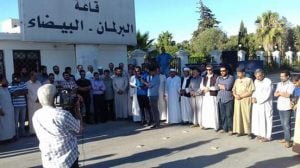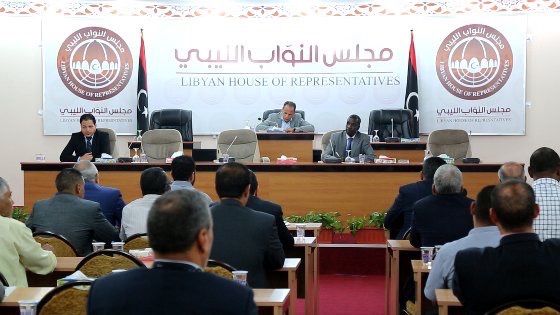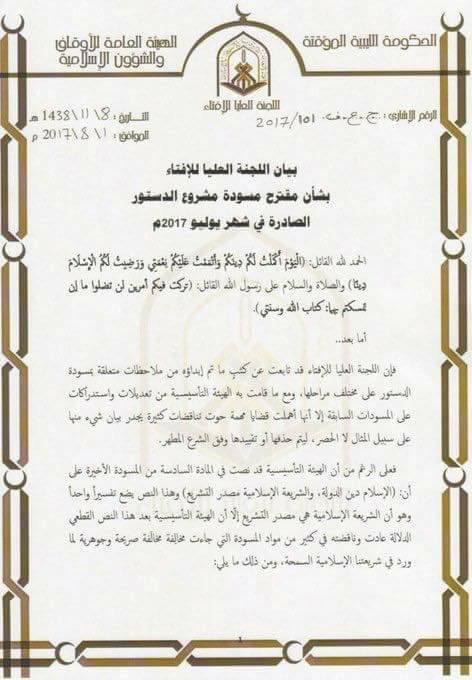By Hadi Fornaji.

Tunis, 2 August 2017:
Opposition to the draft constitution proposed by the Constitution Drafting Assembly (CDA) continues to grow across the Libyan political spectrum, despite support for it from Presdiency Council head Faiez Serraj and the UN.
- A group of some 41 prominent Libyans including media personalities, political figures and activists, mainly from the east of the country, have signed a letter calling on the House of Representatives not to authorise a referendum on the CDA’s draft, claiming that it had not been legally authorised;
- The Salafist-controlled and controversial awqaf (endowments) and Islamic affairs authority under the Beida-based interim government has rejected it claiming that it violates Sharia law;
- The Amazigh Supreme Council (ASC), which is having its own separate battle with the awqaf authority, says it intends to take legal action against the CDA;
- Demonstrators said to be backed by the municipal council in Beida (where the CDA is based), as well as by local tribal elders and civil society activists, yesterday afternoon organised another protest outside the CDA’s headquarters in the town.
Despite the confusion on Saturday and Sunday as to whether it had been properly approved by the CDA, the assembly’s leadership decided it had, and called on the High National Elections Commission (HNEC) to prepare for a referendum. The leadership did so after making some small but significant changes to the rules as to whom would be eligible to stand in presidential elections, such as removing the restriction barring those who had held dual nationality within the previous five years.
For the referendum to go ahead, there has to be a law passed by the HoR. HNEC head Emad Al-Sayeh who yesterday disclosed that he needed at least four months to prepare for a vote, has been categorical that without an HoR law there can be no referendum.
In an indication that the HoR will either procrastinate or, alternatively, announce that it can take no action until the draft is seen to have been legitimately approved, it is reported that the head of the HoR’s legislation committee, Ramadan Shambash and at least one of its members support the call to ignore the proposed constitution.
Names on the list of those calling for the HoR to do just that resemble a roll call of Libyan media and cultural personalities. They include people such as Salwa Al-Dagheli, former Libya representative to the United Nations in Geneva and prior to that a member of the Transitional National Council; former HoR official Faraj Najm; former Benghazi mayor Omar al-Barasi; writer and former editor of Benghazi’s Al-Kalima newspaper Mohamed Al-Mazoughi; political analyst Abdulhakim Fanoush; and a host of other political heavyweights.
For its part, the Amazigh Supreme Council (ASC) say it intends to go to court to have CDA’s offering annulled on the basis that it did not have the support of Libya’s ethnic minorities.
Under the law setting up the CDA, its final proposal has to be supported by tw-thirds plus one of the members, and at least one each of the two members from the three ethnic minorities: the Amazigh, Tebu and Tuareg. The two Tebu members have already come out against it, thus theoretically invalidating it but the Amazigh do not have any CDA members having boycotted the elections to it in February 2014.
Attacking the draft, ASC spokesman Hisham Hammadi also divulged that the ASC was thinking of declaring an interim constitution “to regulate” the country’s Amazigh areas.








